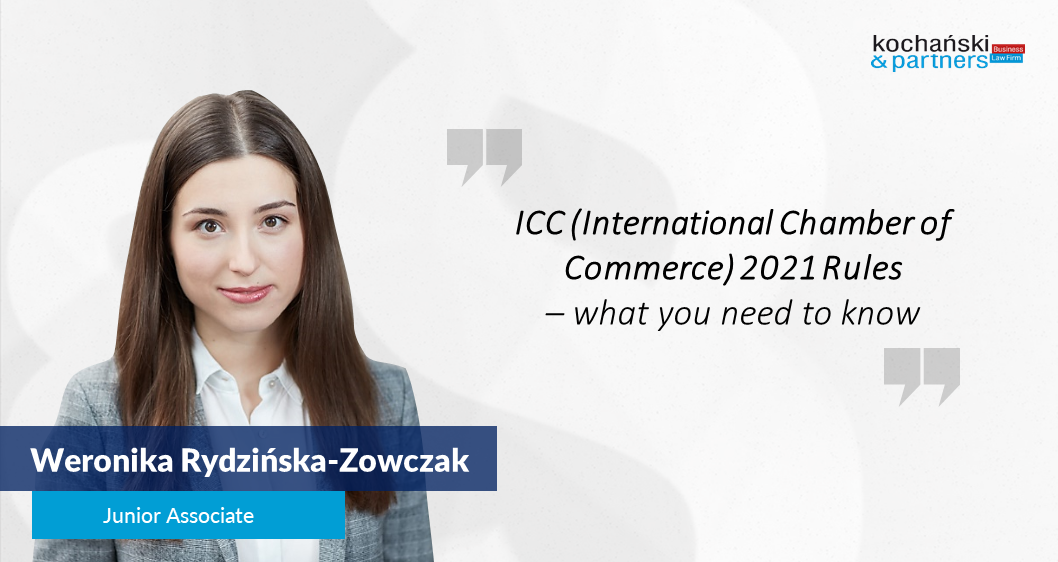Amendments to the ICC International Court of Arbitration Rules (“ICC Court“) in Paris (“2021 Rules“) have entered into force at the beginning of 2021. These new rules have replaced the ICC 2017 Rules (“2017 Rules“) which expired year end 2020, and applied to disputes registered until the end of the 2020. The most important changes include those in the scope of: multi-party disputes, financing agreements with “third-party funders” and regulations concerning investor- state disputes. 2021 Rules also introduce the possibility of organizing hearings in the form of videoconferences – as a response to the COVID-19 pandemic.
According to Alexis Mourre, the former President of the ICC Court, one of the most recognizable arbitration institutions in the world, the amendments to the Rules “mark a further step towards greater efficiency, flexibility and transparency of the Rules, making ICC Arbitration even more attractive, both for large, complex arbitrations and for smaller cases”.
The most important changes:
Multi – Party Arbitration
The new rules facilitate the participation of multiple parties in one proceeding. Until now, all parties had to agree to the participation of another party in the case. In light of the changes, third parties may participate in proceedings solely at the discretion of the adjudicating panel, following the request of one of the parties.
2021 Rules also enable more efficient and less burdensome consolidation of disputes. Although previously such a solution also applied, it was limited to cases between the same parties. Under the new rules, the ICC Court can combine several pending arbitration proceedings into one, even if cases involve different parties and claims are made under more than one contract. A condition for the consolidation of disputes is that they contain the same wording as the individual arbitration agreements.
The changes in the rules are a response to the growing popularity of multi-party disputes. In its Report of 2019, the ICC Court indicated that such cases account for nearly 1/3 of the total number of registered cases. Modifications in the scope of multi-party disputes are of particular importance for corporate disputes, which constitute a significant part of approximately 25,000 cases administered by the ICC Court (per year), in particular for disputes involving parties from the construction industry (approximately 20% of cases) – in which proceedings involving many parties are the most frequent.
The obligation to disclose the “third-party funder”
The ICC Court has also recognized the growing popularity of financing arbitral disputes through “third-party funders”. In general, a “third-party funder” is a third party providing financial support to one of the parties to the proceedings, unrelated to any of the parties involved in the dispute. This support is usually provided through a separate agreement.
Under 2017 Rules, the issue of third-party funders was raised only with respect to arbitrators. In 2019, in its Guidelines, the ICC Court clarified the obligation of arbitrators to disclose circumstances affecting their independence and impartiality.
Under the new rules, the obligation to disclose third-party funders’ contracts has been extended to all parties to the proceedings and must be transmitted immediately to the ICC Court Secretariat, the adjudicating panel and the other parties to the proceedings. The amendment proposed in 2021 Rules reflects the practice of preventing conflicts of interest between parties to proceedings, and is a concept in force in arbitration for a long time.
Arbitration in the “post-COVID era”
2021 Rules is the ICC’s response to the COVID-19 pandemic. Remote communication tools have gained in popularity as a result of restrictions on the functioning of arbitration tribunals around the world. Article 26.1 of 2021 Rules provides that the adjudicating panel may, after consulting the involved parties, conduct hearings by videoconference, telephone conference or other appropriate means of communication.
Some arbitration institutions have already put similar solutions into place. The possibility of conducting proceedings by videoconference was introduced by the Lewiatan Court of Arbitration in May 2020, and in October 2020 – by the London Court of International Arbitration.
Still, most arbitration institutions do not have regulations on remote proceedings, but this does not exclude the possibility of parties conducting proceedings in this way. The solution presented by the ICC Court is not only a response to the COVID-19 pandemic, but also a response to the needs of the modern world and constantly developing new technologies in arbitration.
Investment Arbitration
The amendments also have impact investment arbitration disputes. Under the new rules, if the basis for initiating proceedings is a treaty-based arbitration agreement, the arbitrator cannot be of the same nationality as any of the parties, unless the parties agree otherwise. The 2021 Rules also specify that the institution of an ad hoc arbitrator is not available in investment arbitration.
Modifications to the 2021 Rules are in accordance with the methodology adopted by the International Centre for the Settlement of Investment Disputes (ICSID). The new Article 13.6 reflects the solution adopted in the ICSID Convention, Article 39.
The Risk Committee
Some of the changes to 2021 Rules may have a negative impact on the future of international arbitration.
Article 12.9 allows an ICC Court, in exceptional circumstances, to appoint any member of the panel if the application of the arbitration agreement would lead to a significant risk of unequal treatment and unfairness. In practice, this provision allows the basic principles of arbitration proceedings to be omitted and may result in violation of the consensual nature of arbitration. The parties to the arbitration agreement, not the arbitration court, set the framework for the proceedings. Such a situation may have significant consequences for the validity of a judgment given in arbitration proceedings (at the stage of deciding on the enforceability of an award).
Significantly, this change should be recognised as high-risk due to the lack of any guidance on how the ICC Court should act when modifying the composition of the adjudicating panel, and is currently left to a case-by-case assessment.



